Portugal–Spain 2018 FIFA World Cup bid
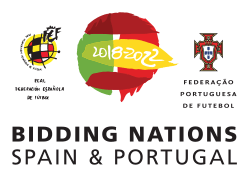
Spain and Portugal 2018 was an official joint Iberian bid for the right to host the 2018 FIFA World Cup. The International Federation of Football Association (FIFA) invited its member associations to bid for either the 2018 or the 2022 final tournaments, or both. The Portuguese Football Federation (FPF) and the Royal Spanish Football Federation (RFEF) submitted together a bid for both editions, but with the focus on winning the privilege to host the 2018 finals. Due to the withdrawal of all non-European bids for the 2018 edition, the Spanish-Portuguese bid, and that of all other European bidding nations, were effectively considered ineligible for the 2022 campaign.
On December 2, 2010, after a vote of the FIFA Executive Committee at its headquarters in Zürich, the Iberian bid lost the 2018 hosting rights to Russia, in a two-round voting, collecting seven votes against Russian's thirteen in the final round.
Schedule
| Date | Notes |
|---|---|
| 15 January 2009 | Applications formally invited |
| 2 February 2009 | Closing date for registering intention to bid |
| 16 March 2009 | Deadline to submit completed bid registration forms |
| 14 May 2010 | Deadline for submission of full details of bid |
| 30 August-2 September 2010 | Inspection committee visits Portugal/Spain[1] |
| 2 December 2010 | FIFA to appoint hosts for 2018 and 2022 World Cups |
Details
Eighteen venues across sixteen cities in Spain made the final bid package as potential host venues for the tournament. In Portugal, only the two most populous cities - Lisbon (2 venues) and Porto - earned a place in the final bid package. In all likelihood, based on the assumption that FIFA allows twelve venues for the tournament, nine venues would be allocated to Spain and the remaining three would go to Portugal.
Potential venues
Submitted bid venues
The following are the 21 venues that were submitted to FIFA on 14 May 2010 as part of the FPF–RFEF's bid to host the 2018/2022 FIFA World Cup:[2]
| Barcelona, Spain | Madrid, Spain | Valencia, Spain | Madrid, Spain | Lisbon, Portugal | Sevilla, Spain |
|---|---|---|---|---|---|
| Camp Noua[3] | Santiago Bernabéua[4] | Nou Mestalla[5] | Estadio Olímpico de Madrid[6] | Estádio da Luzb[7] | La Cartuja[8] |
| FC Barcelona, Spain | Real Madrid, Spain | Valencia CF (New Stadium) |
Atlético Madrid, Spain | S.L. Benfica, Portugal | |
| Capacity: 100,000 | Capacity: 80,354 | Capacity: 75,000 (partially constructed) |
Capacity: 73.000 (under construction : finish 2016) |
Capacity: 65,647 | Capacity: 57,580 |
| |
 |
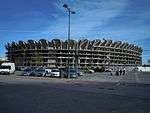 |
|
 |
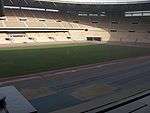 |
| Barcelona, Spain | Bilbao, Spain | Porto, Portugal | Lisbon, Portugal | Zaragoza, Spain | Badajoz, Spain |
| Lluís Companys[9] | San Mamés Barria[10] | Estádio do Dragãob[11] | Estádio José Alvaladeb[12] | Nuevo Estadio de San José[13] | Estadio Nuevo Vivero[14] |
| Athletic Bilbao (New Stadium) |
F.C. Porto | Sporting CP | Real Zaragoza (New Stadium) |
CD Badajoz | |
| Capacity: 55,926 | Capacity: 53,000 | Capacity: 50,399 | Capacity: 50,076 | Capacity: 50,000 (proposed stadium : finish 2013) |
Capacity: 15,198 (plans to expand to 48,000) |
| |
 |
.jpg) |
 |
||
| Santander, Spain | Málaga, Spain | A Coruña, Spain | San Sebastián, Spain | Valladolid, Spain | Vigo, Spain |
| El Sardinero[15] | Nueva Rosaleda[16] | Riazora[17] | Anoeta[18] | Nuevo José Zorrillaa[19] | Nuevo Balaídosa[20] |
| Real Racing Club | Málaga CF (New Stadium) |
Deportivo de La Coruña | Real Sociedad | Real Valladolid | Celta de Vigo (New Stadium) |
| Capacity: 22,271 (plans to expand to 45,400) |
Capacity: 45,000 (proposed stadium : finish 2016) |
Capacity: 35,600 (plans to expand to 45,000) |
Capacity: 32,076 (plans to expand to 43,650) |
Capacity: 26,512 (plans to expand to 43,650) |
Capacity: 42,381 (proposed stadium : finish 2017) |
| |
 |
|
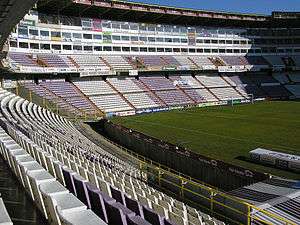 |
| |
| Murcia, Spain | Alicante, Spain | Gijón, Spain | |||
| Nueva Condomina[21] | José Rico Pérez[22] | El Molinón a [23] | |||
| Real Murcia | Hércules CF | Sporting de Gijón | |||
| Capacity: 31,179 (plans to expand to 41,000) |
Capacity: 29,681 (plans to expand to 40,000) |
Capacity: 25,885 (plans to expand to 40,000) |
|||
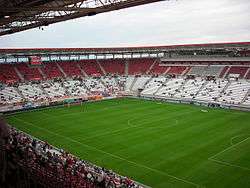 |
|
 |
a: Stadium/site used in the 1982 FIFA World Cup.
b: Stadium/site used in the UEFA Euro 2004.
Rejected bid venues
The following is a list of stadiums that were considered at one time as part of the FPF–RFEF's bid to host the 2018/2022 FIFA World Cup, but did not make the final cut:
| Sevilla | Sevilla | Cornellà de Llobregat | Elche | Oviedo |
|---|---|---|---|---|
| Estadio Benito Villamarín | Ramón Sánchez Pizjuán | Cornellà-El Prat | Manuel Martínez Valero | Nuevo Carlos Tartiere |
| Real Betis | Sevilla FC | RCD Espanyol | Elche CF | Real Oviedo |
| Capacity: 52,745 | Capacity: 45,500 | Capacity: 40,500 | Capacity: 36,017 | Capacity: 30,500 |
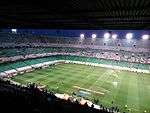 |
|
 |
 |
|
| Faro | Braga | Málaga | Salamanca | Girona |
| Algarve | Municipal de Braga | La Rosaleda | Helmántico | Estadi Montilivi |
| S.C. Farense Louletano D.C. |
S.C. Braga | CD Málaga | UD Salamanca | Girona FC |
| Capacity: 30,305 | Capacity: 30,154 | Capacity: 30,044 | Capacity: 17,341 | Capacity: 10,500 |
| |
|
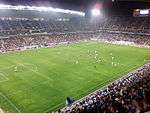 |
 |
 |
References
- ↑ "FIFA receives bidding documents for 2018 and 2022 FIFA World Cups" (Press release). FIFA.com. 2010-05-14. Retrieved 2010-07-31.
- ↑ "Portuguese-Spanish Proposed FIFA World Cup Stadiums". Retrieved 2010-05-14.
- ↑ Iberia's Bid Stadiums: Camp Nou
- ↑ Iberia's Bid Stadiums: Santiago Bernabéu
- ↑ Iberia's Bid Stadiums: Nuevo Mestalla
- ↑ Iberia's Bid Stadiums: Nuevo Etadio de Madrid
- ↑ Iberia's Bid Stadiums: Estádio da Luz
- ↑ Iberia's Bid Stadiums: Estadio Olímpico de Sevilla
- ↑ Iberia's Bid Stadiums: Estadi Olímpic Lluís Companys
- ↑ Iberia's Bid Stadiums: Nuevo San Mamés Barria
- ↑ Iberia's Bid Stadiums: Estádio do Dragão
- ↑ Iberia's Bid Stadiums: Estádio José Alvalade
- ↑ Iberia's Bid Stadiums: Nuevo Estadio de San José
- ↑ Iberia's Bid Stadiums: Nuevo Vivero
- ↑ Iberia's Bid Stadiums: Nuevo Sardinero
- ↑ Iberia's Bid Stadiums: Nueva Rosaleda
- ↑ Iberia's Bid Stadiums: Estadio Riazor
- ↑ Iberia's Bid Stadiums: Estadio Anoeta
- ↑ Iberia's Bid Stadiums: Nuevo José Zorilla
- ↑ Iberia's Bid Stadiums: Nuevo Balaídos
- ↑ Iberia's Bid Stadiums: Nuevo Balaídos
- ↑ Iberia's Bid Stadiums: José Rico Pérez
- ↑ Iberia's Bid Stadiums: El Molinón
